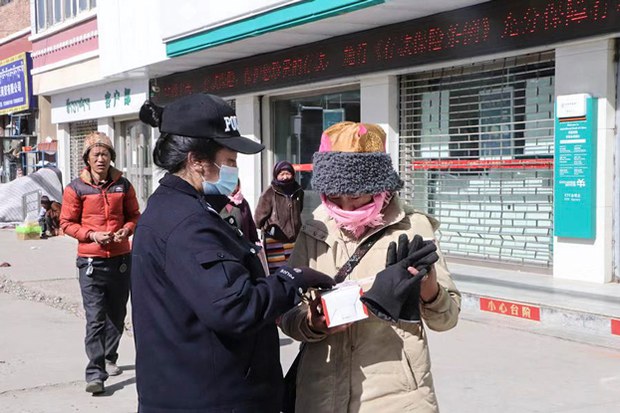On Lhasa riot anniversary, Chinese authorities search Tibetans, keep up surveillance
Share

A police officer searches a Tibetan woman’s cell phone on a street in Lhasa, capital of western China’s Tibet Autonomous Region, March 11, 2023.
Chinese authorities have maintained their interrogations of Tibetans living in Lhasa to determine if they have contacted people outside Tibet and stepped up surveillance measures to prevent such communication for another politically sensitive anniversary in March, according to sources inside the vast western region.
March 14 marks the 15th anniversary of a 2008 riot in Lhasa during which Chinese police suppressed peaceful Tibetan protests and led to the destruction of Han Chinese shops in the city and deadly attacks on Han Chinese residents.
The event sparked a wave of demonstrations against Chinese rule that spread into Tibetan-populated regions of western Chinese provinces. Security forces quelled the protests and detained, beat or shot hundreds of Tibetans.
“Today, March 14, is a very sensitive date, and there are more restrictions in place than usual, so it’s better not to contact us,” one Tibetan source said in a written message to Radio Free Asia.
“There are ‘interrogation posts’ stationed near all the streets that lead to Jhokang Temple, Potala Palace and the Sera and Drepung monasteries,” he wrote. “They are searching the cell phones and the backpacks of tourists and anyone who is walking around these places.”
China maintains a tight grip on Tibet, restricting Tibetans’ political activities and peaceful expression of cultural and religious identity as Buddhists. Tibetans frequently complain of discrimination and human rights abuses by Chinese authorities and policies they say are aimed at wiping out their national and cultural identity.
So far, police have interrogated two Tibetans from Lhasa for allegedly contacting people outside Tibet, and it has become very difficult for Tibetans to communicate by phone with others who live in exile outside the region, according to two people who know about the situation.
Summoned by police
Police have continued tight scrutiny of residents of the capital and random searches of their cell phone and online communications, they said.
“Two friends of mine and I received a call from the local police station a few days ago and were summoned to the police station,” a second Tibetan source said.
“They asked us to share all the details of people that we have contacted and the information we have shared with them,” he said.
The police officers made photocopies of their identity cards and a record of everything on their devices, he said. They also warned the trio not to contact anyone outside the region.
RFA reported earlier that police in Lhasa, the region’s administrative capital with a population of about 560,000 people, increased security measures ahead of the March 10 anniversary of a 1959 uprising against Chinese troops that had invaded the region a decade earlier.
Beginning Feb. 25, security personnel began randomly checking public spaces, guesthouses and hotels, and areas where Tibetan Buddhists perform religious activities and do businesses. They also stopped people to check their cell phones to ensure they had not been in contact with anyone living outside the region – considered a crime.
Translated by Tenzin Dickyi for RFA Tibetan. Edited by Roseanne Gerin and Malcolm Foster.







